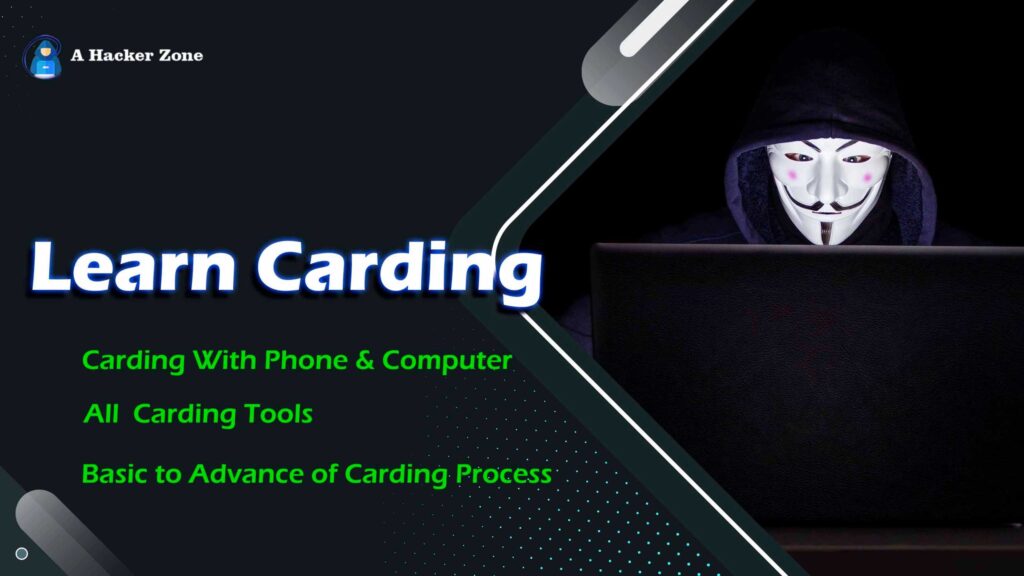How to Do Carding Without Getting Caught
How to do carding without getting caught: In the realm of cybercrime, carding refers to the illegal practice of using stolen credit card information to make unauthorized purchases or transactions. Engaging in carding activities can have severe legal consequences, as it involves identity theft and financial fraud. However, it is essential to understand the mechanics behind carding to protect oneself from falling victim to such scams. In this article, we will explore the topic of carding, shedding light on preventive measures individuals can take to safeguard their financial information. We will also discuss the potential legal consequences of carding and provide tips on how to stay secure in the digital landscape.
Table of Contents
- Introduction
- Understanding Carding
- Risks and Legal Consequences of Carding
- Protecting Yourself from Carding Scams
- Tips for Secure Online Transactions
- Avoiding Suspicion While Carding
- Conclusion
- FAQs
Introduction
In today’s digital age, online transactions have become commonplace, revolutionizing the way we shop and conduct business. Unfortunately, this convenience has also attracted the attention of cybercriminals, leading to the rise of carding activities. Carding involves the unauthorized use of stolen credit card information to make fraudulent purchases. In the following sections, we will delve deeper into the intricacies of carding and explore strategies to avoid falling victim to such scams.
Understanding Carding
Carding is a sophisticated form of cybercrime that requires knowledge of how the payment card system operates. Cybercriminals obtain credit card information through various means, including hacking into databases, skimming devices, or purchasing data from dark web marketplaces. Once they have the necessary information, they can proceed to make fraudulent transactions or sell the data to other criminals.
Risks and Legal Consequences of Carding
Engaging in carding activities poses significant risks, both legally and ethically. Carding is illegal in most jurisdictions, and individuals caught participating in such activities may face severe penalties, including imprisonment and substantial fines. Additionally, victims of carding scams can suffer financial losses, damage to their credit history, and emotional distress.
Protecting Yourself from Carding Scams
To protect yourself from carding scams, it is crucial to adopt robust security practices. Here are some effective measures you can take:
- Use Strong and Unique Passwords: Create strong, complex passwords for your online accounts and avoid reusing them across multiple platforms. Consider using a reliable password manager to securely store your credentials.
- Enable Two-Factor Authentication (2FA): Enable 2FA whenever possible to add an extra layer of security to your online accounts. This ensures that even if your password is compromised, an additional verification step is required to access your account.
- Regularly Monitor Your Financial Statements: Keep a close eye on your bank and credit card statements, promptly reporting any suspicious transactions to your financial institution. Early detection is crucial in minimizing the potential impact of carding scams.
- Shop Only from Trusted Websites: Stick to reputable and well-established online retailers when making purchases. Look for secure payment gateways, indicated by the presence of SSL certificates, to ensure the protection of your financial information.
Tips for Secure Online Transactions
When conducting online transactions, it is essential to prioritize security. Here are some tips to ensure secure transactions:
- Utilize Secure Payment Methods: Whenever possible, opt for secure payment methods such as credit cards or reputable third-party payment processors. These methods offer additional layers of protection against fraudulent activities.
- Be Cautious with Personal Information: Avoid sharing sensitive personal information, such as your Social Security number or full address, unless necessary. Legitimate merchants typically require minimal personal data for successful transactions.
- Verify Website Security: Before entering payment information on a website, verify its security by checking for SSL certificates and a padlock symbol in the browser’s address bar. These indicators confirm that the connection is encrypted, safeguarding your data.
Avoiding Suspicion While Carding
While this article primarily focuses on educating individuals about the risks associated with carding, it is essential to emphasize that engaging in such illegal activities is strongly discouraged. Carding not only violates the law but also harms innocent individuals who may fall victim to these scams.
How to do carding without getting caught
Conclusion
Carding is a serious cybercrime that can have devastating consequences for both victims and perpetrators. By understanding the mechanics behind carding and implementing robust security measures, individuals can protect themselves from falling victim to these fraudulent activities. Remember, it is crucial to prioritize the security of your financial information and conduct online transactions only through trusted platforms.
FAQs
Q1: Is carding legal? A1: No, carding is illegal in most jurisdictions and can result in severe legal consequences.
Q2: How can I protect myself from carding scams? A2: To protect yourself, use strong and unique passwords, enable two-factor authentication, regularly monitor your financial statements, and shop only from trusted websites.
Q3: What should I do if I suspect I am a victim of carding? A3: If you suspect unauthorized transactions or fraudulent activities on your accounts, contact your financial institution immediately to report the incident and take appropriate action.
Q4: Are there any legitimate uses for carding techniques? A4: No, carding techniques are primarily employed for illegal activities, and engaging in such practices is strongly discouraged.
Q5: Can I recover my funds if I fall victim to carding? A5: The recovery of funds depends on various factors, including the circumstances of the incident and the cooperation of law enforcement agencies. It is essential to report the incident promptly to your financial institution and law enforcement authorities.
[tutor_course id=”” exclude_ids=”” category=”” orderby=”ID” order=”DESC” count=”6″]

